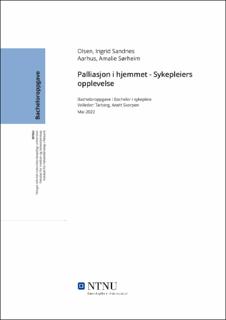| dc.contributor.advisor | Tarberg, Anett Skorpen | |
| dc.contributor.author | Olsen, Ingrid Sandnes | |
| dc.contributor.author | Aarhus, Amalie Sørheim | |
| dc.date.accessioned | 2022-07-15T17:21:51Z | |
| dc.date.available | 2022-07-15T17:21:51Z | |
| dc.date.issued | 2022 | |
| dc.identifier | no.ntnu:inspera:112446249:114197428 | |
| dc.identifier.uri | https://hdl.handle.net/11250/3005977 | |
| dc.description.abstract | Hensikt: Hensikten med oppgaven var å belyse sykepleier i hjemmetjenesten sin opplevelse av å gi palliativ omsorg til kreftpasienter i livets sluttfase.
Metode: Det er en systematisk litteraturstudie som baseres på et systematisk litteratursøk i databasene CINAHL Complete og Svemed+. Litteraturstudien inkluderer 7 kvalitative studier og en oversiktsartikkel som inkluderte 12 kvalitative studier. Analysen ble gjennomført ved hjelp av Evans sin analysemodell.
Resultat: I litteraturstudien kom vi frem til fire hovedtemaer; a) Hjemmet som omsorgsarena, b) Samhandling i helsetjenesten, c) Opplevelse av kompetanse og d) Emosjonell påvirkning.
Konklusjon: Sykepleierne opplevde underbemanning og tidspress. Dette førte til at de ikke fikk gitt den pleien de så behov for. De opplevde at pårørende var en viktig støttespiller samtidig som at samarbeidet kunne være utfordrende. En god sykehusutskrivelse var viktig, men sykepleierne erfarte at utskrivelse til hjemmet kunne være problematisk. Fastlegen opplevdes som en viktig samarbeidspartner i tillegg til palliativt team og kreftkoordinator. Sykepleierne opplevde det som kompetansekrevende å utøve palliasjon i hjemmet. Flere erfarte usikkerhet knyttet til manglende kunnskaper og formidlet at kompetansen burde heves. Sykepleierne opplevde arbeidet som emosjonelt krevende og givende. | |
| dc.description.abstract | Aim: The purpose of this study was to shed light on home care nurses experience of providing palliative care to patients with cancer in the final phase of life.
Method: This is a systematic literature study based on searches in the databases CINAHL Complete and Svemed+. We included seven qualitative design studies and one literature review that included 12 qualitative design studies. The articles were analyzed by using the analytical process described by Evans.
Result: Through the analytical process we found four main themes; a) The home as a care place, b) interactions in health care, c) The experience of competence and d) Emotional impact.
Conclusion: The nurses experienced understaffing and time pressure. As a result, they did not have time to give the patients adequate care. The next of kins were crucial, but the collaboration could be demanding. A good discharge from the hospital was important, but the nurses experienced that it often was problematic. The primary physicians were perceived as an important collaboration partner, as well as palliative team and cancer coordinator. Palliative care at home demanded knowledge. The nurses expressed uncertainty related to lack of knowledge and that the competence should be raised. They also experienced the care as emotionally demanding and rewarding. | |
| dc.language | nob | |
| dc.publisher | NTNU | |
| dc.title | Palliasjon i hjemmet - Sykepleiers opplevelse | |
| dc.type | Bachelor thesis | |
